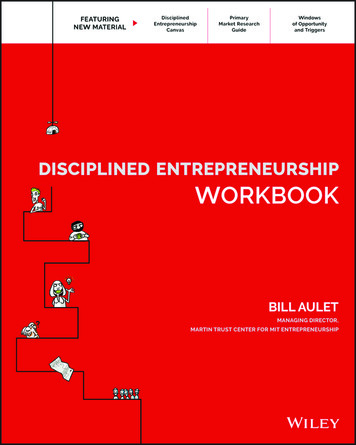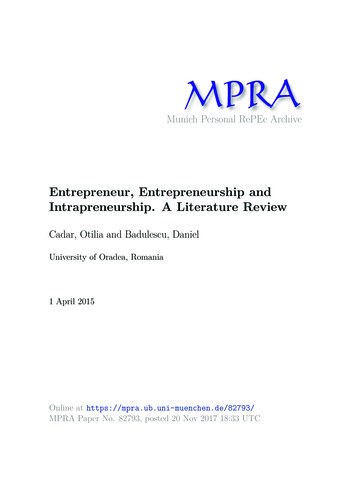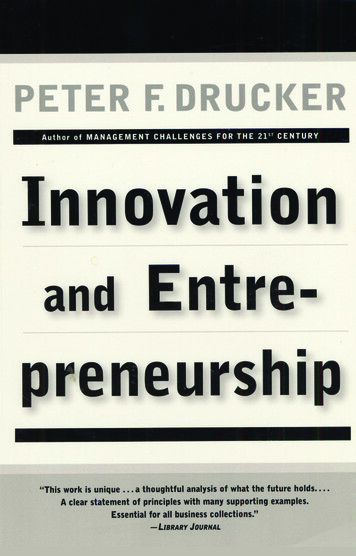
Transcription
ENTREPRENEURSHIPMANAGEMENTPASSION WORKS WONDERS ENTREPRENEURSHIP OPPORTUNITIES IDENTIFICATION ROLE MANAGEMENT MARKETING SOLUTIONVASANT DESAIFirst Edition : 2011MUMBAI NEW DELHI NAGPUR BENGALURU HYDERABAD CHENNAI PUNE LUCKNOW AHMEDABAD ERNAKULAM BHUBANESWAR INDORE KOLKATA GUWAHATI
AUTHORNo part of this publication may be reproduced, stored in a retrieval system, or transmitted in any form or by anymeans, electronic, mechanical, photocopying, recording and/or otherwise without the prior written permission of thepublishers.First Edition : 2011Published by: Mrs. Meena Pandey for Himalaya Publishing House Pvt. Ltd.,“Ramdoot”, Dr. Bhalerao Marg, Girgaon, Mumbai - 400 004.Phone: 022-2386 01 70/2386 38 63, Fax: 022-2387 71 78Email: himpub@vsnl.com Website: www.himpub.comBranch Offices :New Delhi: “Pooja Apartments”, 4-B, Murari Lal Street, Ansari Road, Darya Ganj,New Delhi - 110 002. Phone: 011-23270392, 23278631 Fax: 011-23256286Nagpur: Kundanlal Chandak Industrial Estate, Ghat Road, Nagpur - 440 018.Phone: 0712-2738731, 3296733 Telefax: 0712-2721215Bengaluru: No. 16/1 (Old 12/1), 1st Floor, Next to Hotel Highlands, Madhava Nagar,Race Course Road, Bengaluru - 560 001.Phone : 080-22281541, 22385461, Telefax: 080-22286611Hyderabad: No. 3-4-184, Lingampally, Besides Raghavendra Swamy Matham, Kachiguda,Hyderabad - 500 027. Phone: 040-27560041, 27550139, Mobile: 09848130433Chennai: No. 85/50, Bazullah Road, T. Nagar, Chennai - 600 017.Phone: 044-28144004/28144005Pune: First Floor, "Laksha" Apartment, No. 527, Mehunpura,Shaniwarpeth (Near Prabhat Theatre), Pune - 411 030.Phone: 020-24496323/24496333Lucknow: Jai Baba Bhavan, Church Road, Near Manas Complex andDr. Awasthi Clinic, Aliganj, Lucknow - 226 024.Phone: 0522-2339329, 4068914,Mobile: 9305302158, 9415349385, 9389593752Ahmedabad: 114, “SHAIL”, 1st Floor, Opp. Madhu Sudan House, C.G.Road,Navrang Pura, Ahmedabad - 380 009.Phone: 079-26560126, Mobile: 09327324149,09314679413Ernakulam: 39/104 A, Lakshmi Apartment, Karikkamuri Cross Rd.,Ernakulam, Cochin - 622011, Kerala.Phone: 0484-2378012, 2378016, Mob.: 09344199799Bhubaneswar: 5 Station Square, Bhubaneswar (Odisha) - 751 001.Mobile: 9861046007Indore: Kesardeep Avenue Extension, 73, Narayan Bagh, Flat No. 302,IIIrd Floor, Near Humpty Dumpty School, Narayan Bagh, Indore 452 007(M.P.)Mobile: 09301386468Kolkata: 108/4, Beliaghata Main Road, Near ID Hospital, Opp. SBI Bank,Kolkata - 700 010, Mobile : 09910440956Guwahati: House No. 15, Behind Pragiyotish College, Near Sharma Printing Press,P.O. Bharalumukh, Guwahati - 781009. (Assam).Mobile: 09883055590, 09883055536Typeset by: Prerana Enterprises, Mumbai.Printed at: A to Z, Delhi.
in Recognition of entrepreneurial spiritBill GatesThis “Entrepreneurship Management” study is dedicated to the infotech icon, Bill Gates for hisentrepreneurial spirit in founding and nurturing Microsoft, the biggest software company in the world.Microsoft had revenues of 39.79 billion for the fiscal year ending June 2005, and employs more than 61,000people in 102 countries and regions and opening up windows to revolutionise information technology,fostering entrepreneurship and philanthropic efforts.
PrefaceEntrepreneurship is a dynamic process of creating incremental wealth.It is an applied seience. In the twenty-first century entrepreneurship hasreceived a big push with the information technology revolution sweeping allover the globe.Entrepreneurship is a multi-disciplinary subject and has been rightlyintroduced in various universities and management schools in India.To be successful, an entrepreneur needs expertise in various alliedfields like production, finance, marketing, organisation, human resources,administration, taxation, labour laws, etc., in addition to possessing distinctentrepreneurial qualities. In fact an entrepreneur is a leader motivator with apassion to excel in the activities he undertakes.Entrepreneurship management forms the core of a business venture.The success depends on the core values, management techniques and theirimplementation.Entrepreneurship management is basically concerned with the issues concerning development, growthand organization of enterprises. The very purpose of an enterprise is to carry out business in a smoothand effective manner. It is the prime objective of an entrepreneur to ensure that his basic urge forenterprising abilities be satisfied and that the business earn reasonable returns on the investment.The purpose of the text is to enrich students, entrepreneurs with an understanding of theentrepreneurial process as well as entrepreneurship management practice. In the process to help them tobe better prepared for transforming dreams into realities. consequently. The book is organised to explorethe nature of entrepreneurship management and help to succeed.DISTINGUISHING FEATURESThe book is organised to provide a systematic presentation in founding a new venture, nurtureit to grow and manage it with great success. Chapters are organised to help students to learn aboutentrepreneurship management.Cultivating entrepreneurship often involves changing and sustaining a new set of social values. Thechallenge of this process is perhaps most clearly discerned in the transitional economies of Central andEastern Europe, but in fact many emerging democracies around the world have equally daunting obstaclesto overcome. For this reason Allan Gibb’s article on building a culture of entrepreneurship in Central andEastern Europe provides insights that are applicable to most developing countries.A big part of cultivating entrepreneurship involves establishing an environment where business canflourish.Organization of the TextThere are 30 chapters in the text. This mumber was chosen to provide a sequence of topics that couldbe presented in a normal semester.In particular Chapters 22-30 explore a few of the modern entrepreneurial solutions which will enhancethe effeciency of the organisations and make it globally competitive.A CREATIVE STUDYEntrepreneurship and management is not only creative but also cohesive and interesting. It offersto entrepreneurs, intrapreneurs a rich fare of stimulating ideas, a new vision challenging insights, right
management and entrepreneurial solutions. All people engaged in entrepreneurial activities will findthe study assisting in accelerating and steering the process of economic growth in the right direction.The book would not only be useful to the students of M.Com., M.B.A. and other relatedentrepreneurial courses, but also to administrators, planners, educationists, bankers, project officers,industrial consultants, financial institutions, industrialists and more importantly, to the new entrepreneurs.It is the new entrepreneurs who have the onerous responsibility of shaping the destiny of the nation. Theyare the catalytic agents of change, progress and performance.In the preparation of this book, I have drawn heavily from the published works in the sphere ofentrepreneurial development programmes.I look forward to receiving suggestions from students, entrepreneurs, managers and readers forimproving the contents and presentation of this book.ACKNOWLEDGEMENTMany people — students, business executives, entrepreneurs, professors, and publishing staff havemade this book possible.My debt to those who have helped me in one way or the other is heavy indeed. While I take thisopportunity to thank all of them — they are too numerous to be mentioned in this brief preface — I wouldlike to acknowledge my deep sense of gratitude to Dr. Narendra Kumar for his ungrudging help at allstages, and to the many veteran professional entrepreneurs and consultant economists for their preciseguidance. Thanks are also due to K.N. Pandey, Shri Anuj Pandey, Shri Neeraj Pandey, Ms. PratibhaChowdhary, Phalguni Ravi and M.V. Desai for their suggestions for affecting a number of stylisticimprovements.Lastly, no words can adequately express my debt of gratitude to my late father, Shri RanganathBalwant Mutalik Desai, and my late mother, Smt. Laxmidevi, for generating in me a perennial interest inhigher studies. I will be failing in my duty if I do not mention here the tremendous co-operation I receivedfrom my wife and my daughter in the completion of this voluminous work, in particular, whose patience,support, encouragement, understanding and love helped to bring this effort to fruition.Vasant Desai
C ONTENTSPrefaceUNIT – I : ENTREPRENEURSHIP1.2.3.Entrepreneurship: A Conceptual FrameworkEntrepreneurship: An Indian ScenarioEntrepreneurial Personality4-1718-5758-90UNIT – II : ENTREPRENEURIAL DEVELOPMENT4.5.Entrepreneurial DevelopmentInstitutions in Aid of Entrepreneurship Development94-109110-136UNIT – III : IDENTIFICATION6.7.8.Opportunity IdentificationProduct SelectionEnterprise Launching Formalities140-155156-165166-206UNIT – IV : THE ROLE9.10.Role of Support Institutions to Promote Small EntrepreneursPreliminary Project Report210-235236-246UNIT – V : COST AND PRICING11.Cost of Production251-26612.13.PricingBreak-even Analysis267-286287-298
UNIT – VI : MANAGEMENT14.15.16.17.18.Production ManagementMarketing ManagementHuman Resource ManagementFinancial ManagementLabour Legislations for SSI302-334335-369370-413414-426427-444UNIT – VII : TAXATION AND EXPORT MARKETING19.20.21.TaxationExport MarketingE-Commerce448-465466-503504-518UNIT – VIII : ENTREPRENEURSHIP SOLUTIONS22. Activity Based Costing23. Business Process Re-engineering24. ERP Solutions25. Logistics of Entrepreneurship26. Networking27. Success Strategy28. Technology – The Competitive Weapon29. Enterprise Mobility30. The SWOT Analysis31. The Enterprise Risk ManagementAppendixInnovate in Business 63-566567-572573-576577-584585-598
UNIT – IENTREPRENEURSHIP1. Entrepreneurship: A Conceptual Framework2. Entrepreneurship: An Indian Scenario3. Entrepreneurial PersonalityAzim PremjiChairman, WIPROPremji’s Advice to Startups If you want something hard, you can make it happen There is no substitute for action You should be driven by a deeply captivating challenge Strategy achieves little without hardwork and passion Have a deep and unflinching commitment to values
EntrepreneurshipThe words entrepreneur and entrepreneurship have acquired special significance in the context ofeconomic growth in a rapidly changing socio-economic and socio-cultural climates, particularly in industry,both in developed and developing countries. The experience in the industrialised countries like the UnitedStates of America, Germany, Japan and the United Kingdom are authoritatively cited in support of thisclaim. An in-depth study of the subject thus, becomes not only relevant but also necessary.Entrepreneurial development is a complex phenomenon. Productive activity undertaken by himand constant endeavour to sustain and improve it are the outward expression of this process of developmentof his personality. Such process is crystallisation of social milieu from which he comes, family imbibes,make-up of his mind, personal attitudes, caste system, educational level, parental occupation, and so on.An entrepreneur is one of the important segments of economic growth. Basically he is a personresponsible for setting up a business or an enterprise. In fact, he is one who has the initiative, skill forinnovation and who looks for high achievements. He is a catalytic agent of change and works for the goodof people. He puts up new greenfield projects that create wealth, open up many employment opportunitiesand leads to the growth of other sectors.Who is an Entrepreneur?The entrepreneur as a person brings in overall change through innovation for the maximum socialgood. Human values remain sacred and inspire him to serve society. He has firm belief in social bettermentand he carries out this responsibility with conviction. In this process, he accelerates personal, economicas well as human development. The entrepreneur is a visionary and an integrated man with outstandingleadership qualities. With a desire to excel, he gives top priority to Research and Development. He alwaysworks for the well-being of the society. More importantly, entrepreneurial activities encompass all fields /sectors and fosters a spirit of enterprise for the welfare of mankind.Urges of an EntrepreneurAn urge to exercise power over things and objects persists among all human beings. The urge mayvary in degree from person to person. This urge is an intrinsic quality of an entrepreneur. Sociologistsconsider him as a sensitive energiser – in the modernisation of societies. The psychologists look uponhim as an entrepreneurial man, his motivations and aspirations as conducive to development. Politicalscientists regard him as a leader of the system. To economists, he is a harbinger of economic growth. In allhe combines entrepreneurial drive with leadership and innovativeness.The entrepreneur is a critical factor in the socio-economic change. He is the key person who envisagesnew opportunities, new techniques, new lines of production, new products and coordinates all otheractivities.Importance of an EntrepreneurThe Entrepreneur is one of the most important inputs in the economic development of a country orof regions within the country. Entrepreneurial competence makes all the difference in the rate of economicgrowth. In India, state and private entrepreneurship co-exist. The small-scale industrial sector and businessare left completely to private entrepreneurs. It is in this context that an increasingly important role hasbeen assigned to the identification and promotion of entrepreneurs for this sector.
The need for a broad-based entrepreneurial class in India arises from the need to speed up theprocess of activating the factors of production, leading to a higher rate of economic growth, dispersal ofeconomic activities, development of backward and tribal areas, creation of employment opportunities,improvement in the standard of living of the weaker sections of the society and involvement of all sectionsof the society in the process of growth.Several factors go into the making of an entrepreneur. Individuals who initiate, establish, maintainand expand new enterprises constitute the entrepreneurial class. The socio-political and economicconditions, the availability of industrial technology and know-how, state of art and culture of business andtrading, existence of markets for products and services and the incentives and facilities available forstarting an industry or business, all have a bearing on the growth of entrepreneurship. A conduciveenvironment is created through the policies and interest of the government in economic and industrialdevelopment.Entrepreneurial Behaviours grasping opportunity taking initiative solving problems creatively managing autonomously taking responsibility for, and ownershipof, things seeing things through networking effectively to manageinterdependence putting things together creatively using judgement to take calculated riskEnterpreneurial Attributes achievement orientation and ambition self-confidence and self-esteem perseverance high internal locus of control(autonomy)action orientation preference for learning by doing hard-working determination creativityEnterpreneurial Skills creative problem-solving persuading negotiating selling proposing holistically managing business/projects/situations strategic thinking intuitive decision making underuncertainty networking Logistics will not operate on operational efficiency, but will also demand a strategy aligned to one’sbusiness objectives.Strategic logistics will look beyond its own parish to check for optimisation at the other nodes on yourvalue chain. After all, with linkages to most of the other activities in your company, logistics is morelikely to deliver better results if it can operate in those areas as well. The involvements, usually, tactical,being the result of on-the-spot innovations rather than of established principles. The only rule: dowhat it takes.Laws of Logistics:(1) Hone your operations(2) Channel your resources(3) Serve the end-user(4) Attack the inventories(5) Apply tactical solutions
1ENTREPRENEURSHIP:A CONCEPTUAL FRAMEWORKIntroductionEntrepreneurship is a process undertaken by an entrepreneur to augment his business interests. It isan exercise involving innovation and creativity that will go towards establishing his/her enterprise. It isone of the four mainstream economic factors: land, labour, capital and entrepreneurship.In this chapter, the concept of entrepreneurship and of its related issues are analysed, discussed anddeliberated.Development of the Concept of EntrepreneurshipThe word ‘Entrepreneurship’ appeared first, in French according to Encyclopedia Britannica. In theearly 16th Century, it was applied to those who were engaged in Military expeditions. In the 17thCentury, it was extended to cover civil engineering activities such as construction fortification. The worditself derived from 17th Century French entrepreprendre, refers to individuals who were ‘undertakers’meaning those who “undertook” the risk of new enterprise. They were “contractors” who bore the risksof profit or loss.Oxford English Dictionary (1897) defined entrepreneur simply as “the director or manager, of apublic musical institution; one who ‘gets up’ entertainments, especially musical performance.” Not untilits supplement appeared in 1933, did the dictionary recognise that the word has a place in business, andwould mean “One who undertakes an enterprise especially contractor. acting as intermediary betweencapital and labour.” Joseph Schumpeter noted that the fifteenth century thinkers had established ideasabout the businessman and his functions. But it is not a profession or a permanent occupation and,therefore, it cannot formulate a social class like that of capitalists or wage earners. Psychologically,entrepreneurs are not solely motivated by profit. Schumpeterian ‘innovation’ is a creative response to asituation.Entrepreneurship was a common to prime economic essays for much of the 18th and 19th centuries.Notable early French and Austrian economists wrote enthusiastically as well as exhaustively aboutentrepreneurs as the preservative economists.
Entrepreneurship: A Conceptual Framework13One of the qualities of entrepreneurship is the ability to discover an investment opportunity and toorganise an enterprise, thereby contributing to real economic growth. It involves taking of risks andmaking the necessary investments under conditions of uncertainty and innovating, planning, and takingdecisions so as to increase production in agriculture, business, industry etc.Entrepreneurship is a composite skill, the resultant of a mix of many qualities and traits — theseinclude tangible factors as imagination, readiness to take risks, ability to bring together and put to use otherfactors of production, capital, labour, land, as also intangible factors such as the ability to mobilise scientificand technological advances.A Practical approach is necessary to implement and manage a project by securing the required licences,approvals and finance from governmental and financial agencies. The personal incentive is to make profitsfrom the successful management of the project. A sense of cost consciousness is even more necessary for thelong-term success of the enterprise. However, both are different sides of the same coin. Entrepreneurship liesmore in the ability to minimise the use of resources and to put them to maximum advantage. Without anawareness of quality and desire for excellence, consumer acceptance cannot be achieved and sustained.Above all, entrepreneurship today is the product of team work and the ability to create, build and work as ateam. The entrepreneur is the maestro of the business orchestra, wielding his baton to which the band isplayed.InvestmentTransformationProfit or LossEntrepreneur buysfarm produce atcertain pricesEntrepreneur repacks andtransports farm produceto marketEntrepreneur sells farmproduce in city at uncertainpriceFig. 1.1: Cantillon’s Early View of Entrepreneurs and BehaviourWhat is Entrepreneurship?Entepreneurship is the propensity of mind to take calculated risks with confidence to achieve apre-determined business or industrial objective. In substance, it is the risk-taking ability of the individual,broadly coupled with correct decision-making. When one witnesses a relatively larger number of individualsand that too, generation after generation in a particular community, who engage themselves in the industrialor commercial pursuits and appear to take risks and show enterprise, it is acknowledged to be a commercialclass. The commercial class is a myth just like that of the so-called martial race. There are neither, for all time,martial races nor commercial classes. Communities which in the course history once appeared to be martialin spirit have in later period emerged as mercantile societies. Those who were once concerned with andrelished in trade, later in history seem to have taken to the profession of these word. Today, it is quite evidentto anyone that national communities which have developed world-wide industrial and consequent commercialinterests are militarily powerful; nay, great industrial powers have today become super-military powers aswell. An enterprise finds manifestation in different ways. The capacity to take risk independently andindividually with a view to making profits and seizing an opportunity to make more earnings in themarket-oriented economy is the dominant characteristic of modern entrepreneurship. An enterprise, readyfor the pursuit of business and responsive to profit by way of producing and/or marketing goods andcommodities to meet the expanding and diversifying actual and potential needs and demands of the customers
14Entrepreneurship Managementis what constitutes the entrepreneurial stuff. But this category of enterprising citizens throws up a species ofentrepreneurs who are mostly mercantile in outlook and performance. In countries like India, a new speciesof entrepreneurs is desirable because here the economic progress has to be brought about along with socialjustice.Entrepreneurship in India therefore, has to sub-serve the national objectives. The apparent conflictbetween social objectives and economic imperatives has to be resolved first by the individual entrepreneur inhis own mind and initiate economic growth which includes industrial development as one of the instrumentsof attaining the social objectives. A high sense of social responsibility is thus an essential attribute of theemerging entrepreneurship in India.Table 1.1Entrepreneurship : Some Important DefinitionsJoseph Alois Schumpeter : Schumpeter described entrepreneurship as a process to shatter the status quo(1883-1957)through new combinations of resources and new methods of commerce.Richard Cantillon :Entrepreneurship is a matter of foresight and willingness to assume risks, whichis not necessarily connected with the employment of labour in some productiveprocess.Leon Walrus :Entrepreneurship is not itself a factor of production, but rather a function thatcan be carried on.William Diamond :Entrepreneurship is equivalent to enterprise which involves the willingness toassume risks in undertaking an economic activity particularly a new one.Jaffrey J.A. Timmons :Entrepreneurship is the ability to create and build something from practicallynothing. A human creative activity.Janil andHoward Stevenson :Entrepreneurship is a process by which individuals — either on their on orinside organisation — pursue opportunities without regard to the sources theycurrently control.Isrel Kirzner :Entrepreneurship means alertness towards profit opportunities.Arthur H. Cole :Entrepreneurship is the purposeful activity of an individual or a group ofassociated individuals, undertaken to initiate, maintain or aggrandise profit byproduction or distribution of foods and services.Everett E. Hessins :Entrepreneurship meant the function of seeking investment and productionopportunity, organising an enterprise to undertake a new production process,raising labour, arranging the supply of raw materials, finding site, introducinga new technique, discovering sources of raw materials and selecting top managersof day operations of the enterprise.Peter F. Drucker :(1909-2005)Entrepreneurship is neither a science nor an art. It is a practice. It has knowledge,base knowledge in entrepreneurship is a means to an end, it is not just aboutmaking money. It is about imagination, flexibility, creativity, willingness tothink continuously, readiness to take risks, affiliate to moguls, agents of protonaction and cape city to see change as an apportunity. It is also about marryingpassion and process with a good dose of perseverance.M. Low andJ. Mac Millan :Entrepreneurship is the creation of an innovative economic organisation. Corenetwork of organisations for the purpose of gain or growth under conditions ofrisk and uncertainty.
Entrepreneurship: A Conceptual Framework15H. Aldrich and C. Zimmer: The definition of entrepreneurship includes more than the mere creation of abusiness, it also includes the generation and implementation of an idea.Robert Ronstadt :Entrepreneurship is the dynamic process of creating incremented wealth. Thewealth is created by individuals who assume the major risks in terms of equity,time and /or career commitment or provide unlike for some produce or service.Robert D. Hisrich :Entrepreneurship is the process of creating something new with value by devoting.The necessary time and effort assuming the accompanying financial, psychic,and bold risks and receiving. The resulting rewards of monetary and personalsatisfaction and independence.John J. Kao :Entrepreneurship is the attempt to create volume through regulation of businessopportunity, the management of risk-taking appropriate to the opportunity andthrough the communicative and management skills to mobilise human, financialand scattered resources necessary to bring a project to functioning.Robert K. Lamb:Entrepreneurship is that form of social decision which is performed by economicinnovators.V. R. Gaikwad :Entrepreneurship connotes innovativeness, an urge to take risk in face ofuncertainties and an intuition.Musscleman and Jackson : Entrepreneurship is the investing and risking of time, money, and effort to starta business and make it successful.H. N. Pathak :Entrepreneurship involves, (i) Perception of an opportunity (ii) Organisms aindustrial unit, and (iii) Running the industrial unit as a profitable going andgrowing concern.The GlobalEntrepreneurship Monitor : Entrepreneurship the process of planning, organising, operating, and assumingthe risk of a business venture is now a mainstream activity.The culture of entrepreneurship is deeply rooted: Entrepreneurs are celebratedrole models, failure is seen as a learning experience, and the entrepreneurialcareer option is regarded as attractive. In today’s economic environment,entrepreneurship is a key employment of SEPERSONPROCESS OF ACTIONOBJECTFig. 1.2: Concept of EntrepreneurshipStimulation of EntrepreneurshipEntrepreneurship development is probably one of the most elusive, complicated and perplexing issuesin the promotion and growth of small enterprises. Recently, a number of development agencies have beeninvolved. However, in spite of all these efforts there have been only a few partially successful programmes,and there are many Instances of colossal failures in this field.
Entrepreneurship Management16The stimulation of entrepreneurship is a function of both internal and external variables. The presenceof certain personal qualities in an individual is a requisite. Some of the findings about entrepreneurs in Nepalare as follows:(a)Mainly there are two types of entrepreneurs: the Government and private individuals.(b)In a family-run business the entrepreneur is owner as well as manager. Entrepreneurs arefrequently found to have parents who were engaged in business-related occupations. Membershipin certain types of communities (Newars, Marwadis, Gurung etc.) is highly correlated withentrepreneurship.(c)Many people who migrated from the hills to the southern part of the country (Terai), andreturned have become entrepreneurs.(d)In the family, a change is taking place. Now the educated young members are becomingentrepreneurs rather than head of the family who generally is old.THE THREE ATTRIBUTES OF LEADERSHIPA leader has the ability to. Demonstrate strategic savvy Drive value creation for all Build industry/stakeholder . thinkstrategicallycredibility Inspire high performance Understand and invest in. buildengagementpeopleBuild operating muscleHold people to accountConfront reality decisivelyPromote collaboration &transparency. driveaccountabilityand deliver Act as a role modelOPERATING DEFINITION OF POLICY ENTREPRENEURSHIPPolicy InnovativenessAvailability of Equity or Equity-like funds.Efforts to assemble public or joint public-private equity funds locally.Willingness of local developers to risk some of their resources on small or new firms.Creation-of Incubator Facilities for new or young firms.Availability and nature of small business technical assistance.Small Business TargetingPresence of an explicit small business component in the local development organisation.Amount of staff resources devoted to small firm concerns.
Entrepreneurship: A Conceptual Framework17Percentage of capital funds channeled through development organisations into young ventures lessthan 3 years old.Policy CommitmentSupport of local governmental bodies for economic development— public monies channeled into loan programs— public monies supporting local development organisationsCharacteristics of Public Support—
The book is organised to explore the nature of entrepreneurship management and help to succeed. DISTINGUISHING FEATURES The book is organised to provide a systematic presentation in founding a new venture, nurture it to grow and manage it with great success. Chapters are organised to











